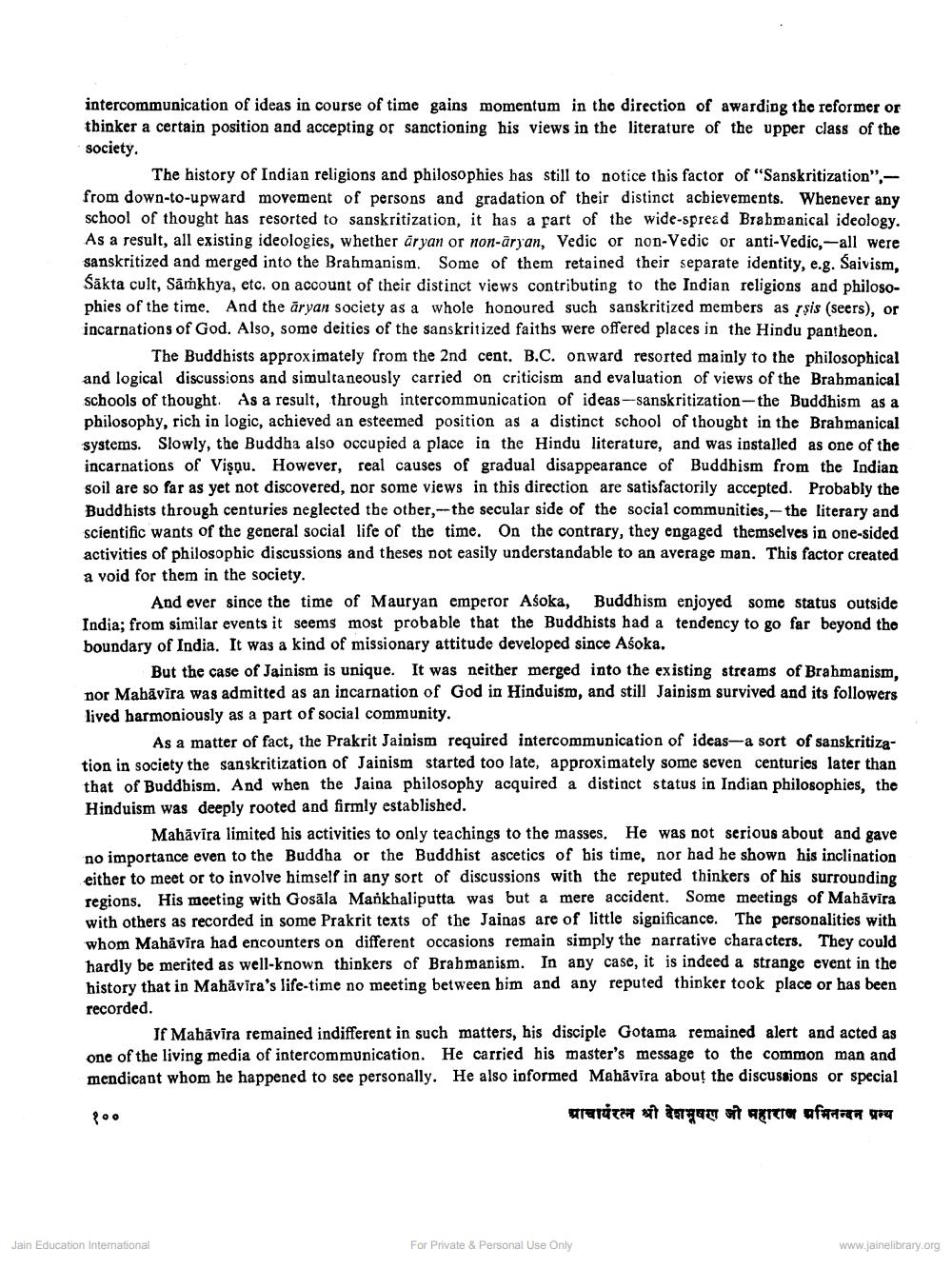Book Title: Survival of Jainism Author(s): Bansidhar Bhatt Publisher: Z_Deshbhushanji_Maharaj_Abhinandan_Granth_012045.pdf View full book textPage 4
________________ intercommunication of ideas in course of time gains momentum in the direction of awarding the reformer or thinker a certain position and accepting or sanctioning his views in the literature of the upper class of the society. The history of Indian religions and philosophies has still to notice this factor of "Sanskritization”,from down-to-upward movement of persons and gradation of their distinct achievements. Whenever any school of thought has resorted to sanskritization, it has a part of the wide-spread Brahmanical ideology. As a result, all existing ideologies, whether aryan or non-aryan, Vedic or non-Vedic or anti-Vedic, -all were sanskritized and merged into the Brahmanism. Some of them retained their separate identity, e.g. Saivism, Sākta cult, Samkhya, etc. on account of their distinct views contributing to the Indian religions and philosophies of the time. And the āryan society as a whole honoured such sanskritized members as rsis (seers), or incarnations of God. Also, some deities of the sanskritized faiths were offered places in the Hindu pantheon. The Buddhists approximately from the 2nd cent. B.C. onward resorted mainly to the philosophical and logical discussions and simultaneously carried on criticism and evaluation of views of the Brahmanical schools of thought. As a result, through intercommunication of ideas-sanskritization-the Buddhism as a philosophy, rich in logic, achieved an esteemed position as a distinct school of thought in the Brahmanical systems. Slowly, the Buddha also occupied a place in the Hindu literature, and was installed as one of the incarnations of Visnu. However, real causes of gradual disappearance of Buddhism from the Indian soil are so far as yet not discovered, nor some views in this direction are satisfactorily accepted. Probably the Buddhists through centuries neglected the other,--the secular side of the social communities, the literary and scientific wants of the general social life of the time. On the contrary, they engaged themselves in one-sided activities of philosophic discussions and theses not easily understandable to an average man. This factor created a void for them in the society. And ever since the time of Mauryan emperor Asoka, Buddhism enjoyed some status outside India: from similar events it seems most probable that the Buddhists had a tendency to go far beyond the boundary of India. It was a kind of missionary attitude developed since Asoka, But the case of Jainism is unique. It was neither merged into the existing streams of Brahmanism, nor Mabāvīra was admitted as an incarnation of God in Hinduism, and still Jainism survived and its followers lived harmoniously as a part of social community. As a matter of fact, the Prakrit Jainism required intercommunication of ideas-a sort of sanskritization in society the sanskritization of Jainism started too late, approximately some seven centuries later than that of Buddhism. And when the Jaina philosophy acquired a distinct status in Indian philosophies, the Hinduism was deeply rooted and firmly established. Mahāvīra limited his activities to only teachings to the masses. He was not serious about and gave no importance even to the Buddha or the Buddhist ascetics of his time, nor had he shown his inclination either to meet or to involve himself in any sort of discussions with the reputed thinkers of his surrounding regions. His meeting with Gosāla Mankhaliputta was but a mere accident. Some meetings of Mahävira with others as recorded in some Prakrit texts of the Jainas are of little significance. The personalities with whom Mahävira had encounters on different occasions remain simply the narrative characters. They could hardly be merited as well-known thinkers of Brahmanism. In any case, it is indeed a strange event in the history that in Mahavira's life-time no meeting between him and any reputed thinker took place or has been recorded. Jf Mahāvīra remained indifferent in such matters, his disciple Gotama remained alert and acted as one of the living media of intercommunication. He carried his master's message to the common man and mendicant whom he happened to see personally. He also informed Mahavira about the discussions or special 800 प्राचार्यरत्न श्री वेशभूषण जी महाराजमिनन्दन प्रस्थ Jain Education International For Private & Personal Use Only www.jainelibrary.orgPage Navigation
1 2 3 4 5 6
